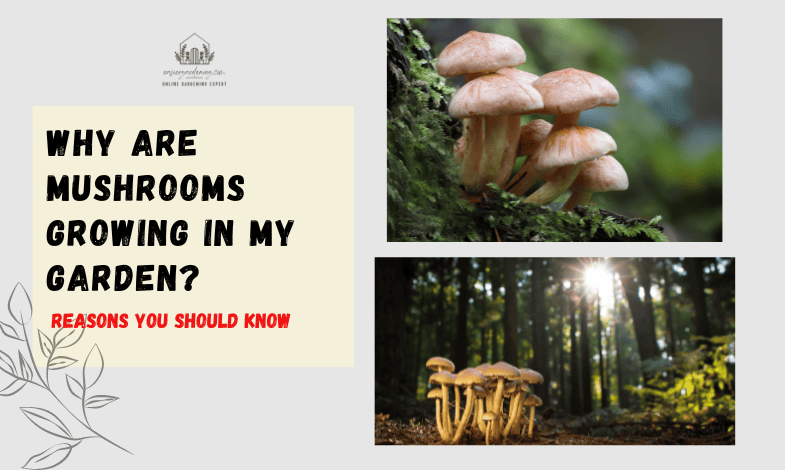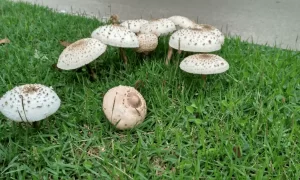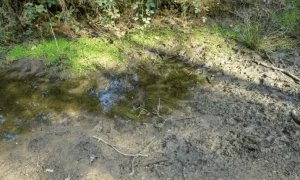Why Are Mushrooms Growing in My Garden: Best Tips to Get Rid of It?: Mushrooms in the garden quickly bring garden owners to despair. Why are mushrooms growing in my garden? Where do mushrooms in the garden come from, and what can be done against them? We explain why mushrooms appear in the garden and reveal what really helps against them in the garden.
Garden owners often despair of the clove swallow: In the garden, the small fawn to dark brown cap fungus with a thin style shows up mainly in the growing phase. Now the garden scar is not yet firmly rooted and closed. In addition, watering is especially important now. And mushrooms in the garden love moisture!
Tips: In most cases, the fungus will disappear on its own if you reduce watering to a normal level. Therefore, the clove swallow is not considered a garden pest. Often, field fungus or meadow mushrooms also thrive in the garden.
Contents
Mushrooms in the Garden
You may ask, “is it bad mushrooms growing in my garden?” well, when mushrooms sprout in your garden, it is primarily a visual nuisance. Especially after a period of wet weather, the small mushroom can often be seen in the garden, but they disappear just as quickly when the soil dries. The visible cap mushroom in the garden is only the fruiting bodies of the mycelium growing in the soil. The underground root network is theoretically in food competition with your garden, but in this competition, the garden wins sovereignly if you give it the right care!
More damage is done to the garden by mushrooms that do not form cap fungi. Garden mushrooms that occur over a wide area include garden rust, red tip, or the common snow mold. These mushrooms damage the garden and cause it to die in infested areas. Therefore, these types of mushrooms are also considered garden pests or garden diseases.
Why Are Mushrooms Growing in My Garden? The reason you should know
Every time the small-cap mushrooms seem to shoot out of the garden overnight, you ask yourself: why are mushrooms growing in my garden? How do the mushrooms in the garden appear so suddenly? The answer is comparatively simple: poor site conditions and improper garden care are usually the reason why mushrooms grow in the garden!
The wind blows the microscopic spores of the mushroom onto the garden. If the seeds meet a weakened garden there, the first fruiting bodies sprout in a short time. Moisture, lack of sunlight, nutrient-poor and acidic soils favor the growth of mushrooms in the garden. Some mushrooms do not grow in the garden itself but on dead wood hidden under the turf. The only thing that helps is to dig up the wood debris.
Practical tip: For the same reason, turf is also often affected by fungal infestation, as its planting substrate is heavily enriched with wood fibers!
Seven Things You Can Do Against Fungus in the garden
If you know what’s causing toxic mushrooms to grow in your garden, you can do something about it too! These tips will help prevent fungus in the garden from growing and are also great for immediate action if you want to do something about the problem:
- Avoid waterlogging: water less frequently, but more thoroughly, rather than a little every day! Loosening the soil (with nail shoes or a pitchfork) also drains the soil.
- Avoid shade: Gardens in the shade are especially susceptible to fungus in the garden.
- Maintain distance from trees: Dead branches are ideal sewing soil for a mushroom! The same applies to roots and stumps of felled trees.
- Maintain garden properly: Scarifying, fertilizing & liming are the best precautions against mushrooms in the garden!
- When dethatching, remove moss and lichens, which retain moisture like a sponge and do not allow the garden to dry out.
- A healthy ornamental garden needs a lot of nutrients; only then will it form a dense turf – the best protection against fungal attack.
- Lime regulates the pH value of the soil: If the soil is too acidic, mushrooms have an easy time of it.
What Helps Against Stubborn Mushrooms in the Garden?
What is visible as a fungus in the garden are only the fruiting bodies of a widely branched mycelium growing in the soil. The above-ground fruiting bodies should be cut out before mowing the garden to avoid spreading the fungal spores over the garden.
Practical tip: If you don’t want to go to the trouble, be sure to use a catch basket when mowing the garden and don’t dispose of the cuttings in the compost. Otherwise, you’ll never get the mushroom off the garden, as you’ll spread the spores further across the garden with each mowing!
Speaking of extensive fungal infestation: In the case of snow mold and the like, thorough draining of the infested garden area usually helps to get the mushroom off the garden. The adjacent shade-providing shrubs or hedges should be thinned if the garden is always in the shade. Aerify the soil with a digging fork. Lean the soil with sand – this also improves its drainage effect. Once you have implemented these measures against mushrooms in the garden, the soil is usually so “churned up” that it is worth reseeding the garden!
Final Thought: Why Are Mushrooms Growing in My Garden?
If you have lost your sleep over the question, why are mushrooms growing in my garden?“, a special feature of mushroom in the garden are the so-called witch rings. These are round fungal networks of cap mushroom two to five centimeters high. They occur, particularly on nutrient-poor, sandy soils. Regular scarifying and fertilizing help to prevent them.
Learn more about How Long Does It Take to Kill Mushrooms with Vinegar?
Chemical agents such as fungicides are not permitted!
Practical tip: If you are not in a hurry, you can “starve out” the fungus by first scarifying and then spreading a 2 to 3 cm layer of sand. Bare spots can be reseeded.



